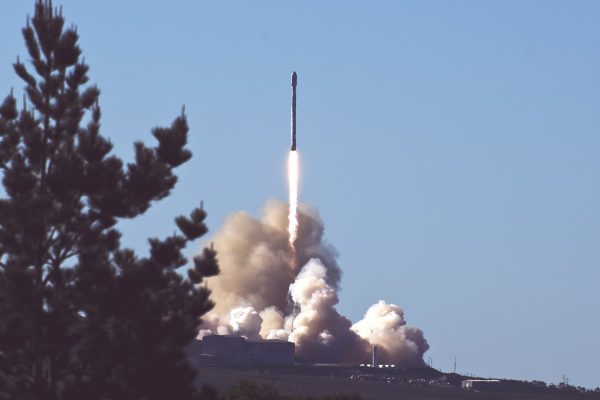

Finance
Where Does SpaceX Get Its Funding?
Published: December 22, 2023
Discover how SpaceX secures its finance and funding for ambitious space exploration projects, gaining insights into the company's financial strategy and sources of funding.
(Many of the links in this article redirect to a specific reviewed product. Your purchase of these products through affiliate links helps to generate commission for LiveWell, at no extra cost. Learn more)
Table of Contents
Introduction
SpaceX, founded by entrepreneur Elon Musk in 2002, is a groundbreaking aerospace manufacturer and space transportation company. It has revolutionized the space industry with its ambitious goals of making space exploration more accessible and affordable. With impressive achievements like the Falcon 9 rocket and the Dragon spacecraft, SpaceX has captured the world’s attention and has become a key player in the space race.
However, the question of how SpaceX is funded arises. Such groundbreaking endeavors require significant financial resources, and understanding the sources of funding is crucial to understanding the company’s financial sustainability and future prospects. In this article, we will explore the various ways SpaceX secures its funding.
From government contracts to commercial partnerships and private investments, SpaceX employs a multi-pronged approach to finance its operations. By diversifying its funding sources, the company not only reduces its dependency on a single entity but also fuels its innovation and growth.
Let’s dive into the details of how SpaceX obtains the funding necessary to fuel its ambitious space exploration initiatives.
Government Contracts
One of the primary sources of funding for SpaceX comes from government contracts. The company has secured numerous contracts with various governmental organizations, including NASA, the United States Air Force, and other international space agencies.
NASA has been a significant partner for SpaceX, awarding the company contracts to transport cargo and crew to the International Space Station (ISS) through the Commercial Resupply Services (CRS) and Commercial Crew Program (CCP). These contracts provide a steady stream of revenue and have played a vital role in SpaceX’s growth and development.
The United States Air Force has also awarded SpaceX contracts to launch military and national security-related satellites into space. These contracts contribute to both the financial stability of the company and the national security goals of the United States.
In addition to NASA and the United States Air Force, SpaceX has secured contracts with other international space agencies, including the European Space Agency and the Canadian Space Agency. These partnerships highlight the global reach and significance of SpaceX’s endeavors.
Government contracts offer several advantages to SpaceX. They provide a stable and reliable source of income, ensuring a steady cash flow for the company’s operations. Furthermore, these contracts often involve multi-year agreements, which provide long-term financial security and enable strategic planning.
However, it is important to note that government contracts are often highly competitive, and the bidding process can be rigorous. SpaceX’s success in winning these contracts can be attributed to its track record of successful launches, reusable rocket technology, and cost competitiveness.
Overall, government contracts play a crucial role in funding SpaceX’s operations. They provide both financial stability and credibility, enabling the company to pursue its ambitious goals of space exploration and colonization.
Commercial Contracts
In addition to government contracts, SpaceX also secures funding through commercial contracts. These contracts involve partnerships with private companies and organizations seeking to launch satellites or payloads into space.
SpaceX’s Falcon 9 rocket has gained significant popularity and trust in the commercial space industry. Its reliability, cost-effectiveness, and ability to deliver payloads to orbit have made it an attractive choice for companies looking to launch their satellites.
Notable commercial contracts secured by SpaceX include partnerships with telecommunications companies, such as SES, Iridium Communications, and Viasat. These partnerships involve launching satellites into orbit for global communication services.
SpaceX has also secured contracts with organizations like the National Oceanic and Atmospheric Administration (NOAA) to launch weather monitoring satellites into space. These satellites provide essential data for weather prediction, climate monitoring, and disaster response.
Commercial contracts provide SpaceX with additional revenue streams, beyond government contracts. They allow the company to leverage its rocket technology and launch capabilities to meet the needs of private entities, contributing to its financial stability and growth.
Furthermore, the commercial sector offers SpaceX opportunities for innovation and expansion. As the demand for satellite launches increases, SpaceX can continue to secure more contracts and expand its market presence.
It is worth noting that the increasing competition in the commercial space industry, with the emergence of other private space companies, presents challenges for SpaceX. However, the company’s proven track record and technological advancements give it a competitive edge in securing commercial contracts.
Overall, commercial contracts play a significant role in funding SpaceX’s operations and supporting its mission of advancing space exploration and satellite launch capabilities.
Private Investors
Besides government and commercial contracts, SpaceX also raises funds through private investors. Private investments have played a crucial role in supporting the company’s growth and development, particularly during its early stages.
Elon Musk, the founder of SpaceX, has been a major investor in the company. He has invested a significant amount of his personal wealth into SpaceX, demonstrating his unwavering belief in its potential. Musk’s commitment and financial backing have provided the company with the necessary resources to pursue its ambitious goals.
In addition to Elon Musk’s investment, SpaceX has also attracted funding from other prominent private investors. Notable names include venture capital firms such as Founders Fund, Draper Fisher Jurvetson, and Google Ventures. These investors recognize the disruptive potential of SpaceX’s technology and the immense value it can bring to the space industry.
Private investments not only provide financial resources but also bring valuable expertise and networks. Investors can provide strategic guidance, mentorship, and connections to other potential partners, opening doors to new opportunities for SpaceX.
Furthermore, private investments have helped SpaceX secure the necessary capital for research, development, and the construction of advanced rocket technology. The funds raised from private investors have allowed the company to pursue innovative projects like the Starship spacecraft, a fully reusable vehicle designed for long-duration space travel and colonization.
However, private investments also come with risks. Investors expect a return on their investment, which means SpaceX must demonstrate progress and generate revenue in a competitive market. The company’s ability to attract continued investment relies on its ability to deliver on its promises and maintain a competitive edge in the evolving space industry.
Overall, private investors have played a vital role in financing SpaceX’s ambitious endeavors. Their financial contributions, along with their expertise and networks, have supported the company’s growth, innovation, and pursuit of space exploration.
Partnerships and Collaborations
In addition to government contracts, commercial contracts, and private investments, SpaceX also forms partnerships and collaborations with other organizations to secure funding and drive innovation in the space industry.
One significant partnership for SpaceX is its collaboration with NASA. Through the Commercial Crew Program, SpaceX has worked closely with NASA to develop and operate crewed missions to the International Space Station (ISS). This partnership not only provides funding but also strengthens the ties between SpaceX and the leading space agency, enhancing the company’s reputation and credibility.
SpaceX also collaborates with other aerospace companies to leverage their expertise and resources. For example, the company has partnered with Northrop Grumman to provide launch services for its Cygnus spacecraft, which delivers supplies to the ISS. This collaboration allows SpaceX to broaden its service offerings and tap into new markets.
Another notable partnership is with the satellite company Iridium Communications. SpaceX successfully launched multiple Falcon 9 rockets to deploy Iridium’s NEXT constellation, a network of advanced communication satellites. These partnerships not only generate revenue for SpaceX but also contribute to the advancement of satellite technology and global connectivity.
Furthermore, SpaceX has formed partnerships with various research institutions and universities, such as the Massachusetts Institute of Technology (MIT) and the Southwest Research Institute (SwRI). These collaborations enable the company to tap into cutting-edge research, access top talent, and drive innovation in space technology.
Partnerships and collaborations serve as a mutually beneficial way to secure funding while fostering knowledge exchange and driving technological advancements. By working together with other entities, SpaceX can tap into additional resources, expertise, and market opportunities.
These partnerships also facilitate the sharing of risks and costs associated with research and development, making it more feasible for SpaceX to undertake ambitious projects like the Starship spacecraft and the Starlink satellite constellation.
Overall, partnerships and collaborations play a vital role in diversifying SpaceX’s funding sources, driving innovation, and expanding its presence in the space industry.
Conclusion
SpaceX’s journey to revolutionize the space industry and make space exploration more accessible and affordable requires significant financial resources. The company employs a multi-pronged approach to secure funding from various sources.
Government contracts have been instrumental in SpaceX’s funding strategy. Partnerships with organizations like NASA and the United States Air Force provide the company with stable revenue streams and support its ambitious goals of crewed missions to the International Space Station and national security satellite launches.
Commercial contracts with private companies in the telecommunications, weather monitoring, and satellite industries have also played a crucial role in funding SpaceX. These partnerships leverage the company’s rocket technology and launch capabilities to meet the needs of private entities, generating additional revenue and facilitating market expansion.
Private investments, led by Elon Musk’s personal investment and supported by venture capital firms, have been essential for SpaceX’s growth and development. These investments provide financial resources, expertise, and networks to fuel innovation and propel the company forward.
Partnerships and collaborations with organizations such as NASA, other aerospace companies, and research institutions contribute to funding, knowledge exchange, and technological advancements. These partnerships enable SpaceX to access additional resources, broaden its service offerings, and drive innovation in the space industry.
In conclusion, SpaceX’s funding is secured through a combination of government contracts, commercial contracts, private investments, and partnerships. This diversification of funding sources not only supports the company’s financial stability but also fuels its innovation, growth, and ambitious space exploration initiatives.
With its continued success in securing funding and pushing the boundaries of technology, SpaceX is set to shape the future of space exploration and inspire generations to come.














